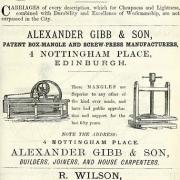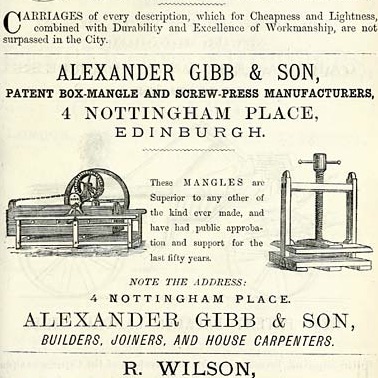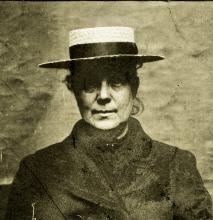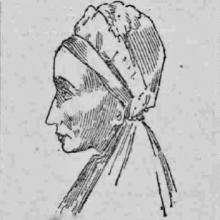
1849–54
PATENT FAMILY MANGLES,
Manufactuory, 4 Nottingham Place, Edinburgh.
----
ALEX. GIBB begs respectfully to announce that his Wareroom at present contains a Large Stock of the various Sizes of his celebrated MANGLES, all manufactured from thoroughly seasoned materials, ensuring durability in any climate.
The Mangles are securely packed free of charge. Price List to be had on application.
Scotsman, 7 March 1849
[Image top-right and below from Edinburgh & Leith Post Office Directory, 1872–73.]

*****
DRAIN AT OLD BROUGHTON.
The LORD PROVOST said he was sorry to learn that the Commission had raised an action against the Governors of George Heriot’s Hospital, requiring them to cover in a drain about Old Broughton.
If the Hospital were found liable to do this, it would cost them no less than L.8000 or L.10,000, as they would not only require to cover in the portion embraced in the action, but a portion extending to two miles in length. He had, therefore, to ask that the board would allow perhaps a month’s delay, to afford the Governors time further to consider the matter.
After some discussion, in the course of which it was stated that several delays had already been granted, the Lord Provost’s request was acceded to.
Scotsman, 14 November 1849
*****
HIGH COURT OF JUSTICIARY.
Friday, March 14.
Adam Riddle, Thomas Riddle, and James Kelly were accused of forcibly breaking into the premises of Mr James Miller, hackney-coach proprietor,[1] Broughton Street Lane, and stealing therefrom a coat, the property of Robert Marshall, coach-driver; but the jury found the charge not proven, and the panels were accordingly dismissed.
Edinburgh Evening Courant, 15 March 1851
[1] Hackney—carriage with 4 wheels, drawn by 2 horses.
*****
HIGH COURT OF JUSTICIARY.
Hay Kemp, a young woman residing in Simpson’s Court, Greenside, pleaded guilty to a charge of culpable homicide, with exception of striking with an axe or cleaver, Mary Niven or Kemp, her mother, and of striking with her fists, pushing about, dragging out, and throwing down in front of the house in which she lived, her said mother, on the 15th February last, who, in consequence of the treatment she had received, shortly after died.
The Lord Justice-General addressed the prisoner to the effect that the offence with which she stood charged under the restricted plea which had been accepted, wore a very different aspect from what it had originally done on the face of the indictment, which charged her with murder, culpable homicide, and the using of a lethal weapon against her mother.
He was willing to believe that she had sustained a previous good character, and, if so, it would be unnecessary for him to impress upon her the heinous guilt of raising her hand against her mother. There had been an unseemly domestic quarrel between a mother and child, in which the blame had rested with the child.
The sentence awarded was imprisonment for twelve calendar months.
Caledonian Mercury, 19 May 1853
*****
DISTRESSING OCCURRENCE.
TWO MEN SUFFOCATED.
A very painful event occurred on Thursday, by which two men, both in the prime of life, were suddenly deprived of existence.
Some time in the forenoon, one of the employees in the confectionary establishment of Mr Littlejohn, Leith Street, having been sent down to the ice-house, at Greenside Lane—a vault to which access is obtained from the street by a trap-door—the candle with which he was furnished came in contact with the matting or straw in which the ice is generally encased. A dense volume of smoke was immediately occasioned, from which the young man made a rapid retreat, exclaiming that the place was on fire.
The alarm reached two firemen, brothers, named Anderson, who were employed in Mr Croall’s coach-work at York Lane. The elder of the two, Daniel, who, we understand, had been for nearly 30 years one of the most active members of the fire brigade, first descended, and having obtained some buckets full of water, threw them on the burning mass. This, of course, in the first instance, only added to the density of the smoke, but Anderson was so satisfied that no danger from fire was to be apprehended, that he ventured down a second and even a third time. Before this, however, a number of the other members of the fire-brigade, including the Superintendent, Mr Mitchell, had arrived on the spot, and were ready to render any assistance that might be needed.
Suddenly, and most unexpectedly, a cry for help was heard from Daniel, and as the cry was not repeated, the worst was feared. His brother John insisted on being the first to go down to his assistance. He was provided, by way of precaution, with a stout rope before he descended. Mr Mitchell, along with another of the firemen named Hill, followed closely, also grasping the rope, one end of which was held by those above.
It is necessary to mention that the mode of gaining access to the vault is by a series of almost perpendicular steps, formed of irregular stone projections on the sides of the shaft, as it may be called, which communicates with the ice-house. With this explanation, it will at once be apparent that it required a very considerable effort to get the insensate body of the elder Anderson removed from the vault. His brother John appears to have easily succeeded in finding him, and had got the rope fastened round his body, when most unfortunately, the chafing which the rope had sustained against a sharp angle of the wall cut it through, and John falling forward, shared the fate of his elder brother, the smoke having immediately overpowered him.
Mr Mitchell made the most desperate attempts to get near the two men; but at this moment Hill, who was on the steps above him, overcome, too, by the sickening fumes of the burning straw which still issued out in great density, fell upon the shoulder of the Superintendent in a state of unconsciousness. Most providentially for both, Mr Mitchell is possessed of more than ordinary strength and activity, and though nearly exhausted by the efforts which he had made, and the stifling atmosphere he had been breathing, he retained enough of vigour to climb to the open air, carrying on his shoulders Hill, who remained in a state of unconsciousness for some time, but at length revived.
As it was obviously most hazardous to attempt reaching the ill-fated men by the entrance to the vault, while it remained in such a dangerous condition, masons were procured, and an aperture knocked out in the side of the ice-house, so as to admit a current of air. When this was effected, a descent below was safely made, and the bodies reached without much difficulty. It is almost unnecessary to mention that from the length of time that had elapsed before they were got out, life was quite extinct.
Thus miserably perished two most efficient members of the fire-brigade. The elder had been nearly 30 years in the force, and his brother about the same time.[2] Both men bore a most exemplary character, and were highly respected by their employers.
They have left widows, but the younger had no family. Daniel, the elder, has left no fewer than nine children, the greater part of whom, however, are grown up. We cannot conclude this melancholy recital without expressing a hope that some fitting expression of consideration and sympathy will be shown by the public, in whose service these unfortunate men perished, to their bereaved relatives.
Caledonian Mercury, 31 July 1854
[2] The world's first municipal fire brigade had been established in Edinburgh in 1824 under the superintendency of James Braidwood (1800–64). A statue of Braidwood was erected in Parliament Square in 2008.
*****



